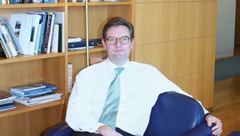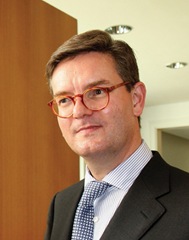Discovering Ireland: Julian King
 The new British Ambassador, Julian King, speaks to Meadhbh Monahan about his desire to see Ireland and the UK working together on “shared challenges” such as the environment and climate change.
The new British Ambassador, Julian King, speaks to Meadhbh Monahan about his desire to see Ireland and the UK working together on “shared challenges” such as the environment and climate change.
Since his arrival to the leafy surroundings of the British Embassy on Merrion Road three months ago, British Ambassador Julian King has been getting straight down to the “business” of leading his team in their various political, economic and consular roles.
Aged 45, King admits many people were surprised that such a young Ambassador was appointed to Ireland. He has no qualms about his age and says that “anyone who gets the opportunity to do this job should leap at it.”
He acknowledges the troubled history between Ireland and Britain but insists on looking towards a future of “shared challenges as neighbours.” He adds: “I hope [my age] will be a positive thing that will allow me to reach out and engage with a wider selection of people here.”
There are a range of things that the embassy as a whole is trying to do, King explains. There are service delivery teams such as UK Trade and Investment (UKTI) who “work to help UK businesses in Ireland and help Irish businesses to invest in the UK.” A consular team deals with problems relating to British people living in Ireland, and a visa and passport team deal with immigrants seeking to live and work in Ireland.
King’s role as Ambassador is to “lead the different parts of the operation, making sure they have the support and resources they need to operate effectively.”
Arriving in the middle of the second Lisbon Treaty debate and the lead up to the budget was “fantastically interesting” for King.
He was impressed by the “vibrant debate” that engaged “not just the political spectrum but civil society as well.”
King thinks that “there are a lot of lessons to be learned across Europe from the example of civil society engagement here in Ireland.”
“It was like being dropped in the middle of a film in fast-forward,” he explains. “That was a great opportunity for someone new because there was so much going on that you were able to get straight into it and engage with all sorts of people from ministers to civil society, the business community and the wider community. And it was not just to say hello, there was immediately a lot of business to be done,” King recalls.
Neighbours
When asked about the turbulent and often violent history between Ireland and Britain King says he “respects our shared past” but continues to look to the future.
He doesn’t directly comment on the fact that many people, particularly in the North, still want a united Ireland. Instead, he claims the UK and Ireland are “intimately inter-linked” and that he has not encountered “cultural barriers.”
“I have encountered goodwill and very positive feedback about the relationship between the UK and Ireland. There are big challenges but in my contact with the Irish Government and Irish authorities I have encountered a lot of positive goodwill to find ways to co-operate between the UK and Ireland.”
The personal welcome King has experienced has been “incredibly warm, friendly and positive.”
He has only one “old fashioned” link to Ireland in that his grandfather was born here when King’s great-grandfather was a sergeant major in the Royal Artillery in the Dublin garrison in 1899 before moving to India. However, King notes that “not a day goes by that I don’t meet someone with a personal link with someone across the Irish Sea.”
Outlining the “very rich links” between the UK and Ireland, King points to the economy.
“The two-way trade flows are enormous,” he says. “They were worth € 16 billion in the first six months of the year and the UK trades with Ireland as much as it does with France which has 15 times the population.”
He adds that Ireland trades with the UK as much as it does with Italy, Germany and France all combined and that Irish exports to the UK, such as pharmaceuticals and ICT are “holding up very well.”
Financial services in the two countries are also closely related, King says. “One of the challenges is to make sure that what’s going on in the two jurisdictions works to mutual benefit, and that there are no surprises or unintended consequences of the different changes and processes that are going on in each country to support their banks.”
King is very keen that the UK and Ireland work as neighbours and partners in the European Union to focus on environment and climate change as “shared challenges.” In light of this one of his first actions as Ambassador was to organise a seminar discussing the UK Climate Change Act. He brought people from the UK and Ireland together with help of Environment Minister John Gormley to look at how domestic legislation could help countries meet the challenges of climate change.
“As neighbours we wanted to share our experiences with Ireland,” King states. He plans to organise a similar seminar for emergency services to discuss how they deal with emergency situations, such as the recent floods in Ireland and Cumbria.
Security
Referring to his previous EU security policy roles, King said he is “a strong advocate of multi-lateral security work” because “you can make a real difference in very difficult circumstances.”
He compares the evolution of the European security defence policy to the Irish approach to multi-lateral engagement in that “it is firmly rooted in the UN, it has a very broad sense of security, it will deploy military means if necessary but always as part of a wider international strategy.”
He says: “I’m impressed with the practical engagement the Irish Defence Forces have had in some of the European defence and security operations such as Chad where they provided the commander of the European forces.”
Commenting on the No camp’s misgivings about conscription at the time of the first Lisbon referendum, King says: “There were some stories that didn’t reflect what was going on in practice or what was envisaged in the Lisbon treaty.”
He believes that “working together, EU nations can have – rooted in the UN – a security role where they deploy a whole range of troops from capacity building, policing and military, where everyone agrees that they can play a role.” That is “a long way from creating a European army or dragooning people,” King states.
King is looking forward to getting “out-and-about” more in 2010. He is “discovering” Dublin and has been to Cork, which he describes as “vibrant.”
The main challenge for the UK and Ireland in the future is “to make sure we continue to get better at this relationship, by which I mean dealing with political problems effectively,” King concludes.
King is married to Lotte Knudsen, Acting Director in the European Commission. She is based in Brussels and visits Dublin at the weekends where they go for walks on the Wicklow Way.
In 2006 he received an Order of St. Michael and St. George (CMG) which is given to people who have carried out non-military service in a
foreign country.
King joined the Foreign and Commonwealth Office in 1985. In 1987 he attended École Nationale d’Administration and was Private Secretary to the British Ambassador in Paris. In 1991 he moved to Luxembourg and The Hague and worked on European defence. In 2003 he went to New York with the UK Mission and covered UN security matters. He has also been the head of cabinet to two European Trade Commissioners, Peter Mandelson and Baroness Catherine Ashton.

